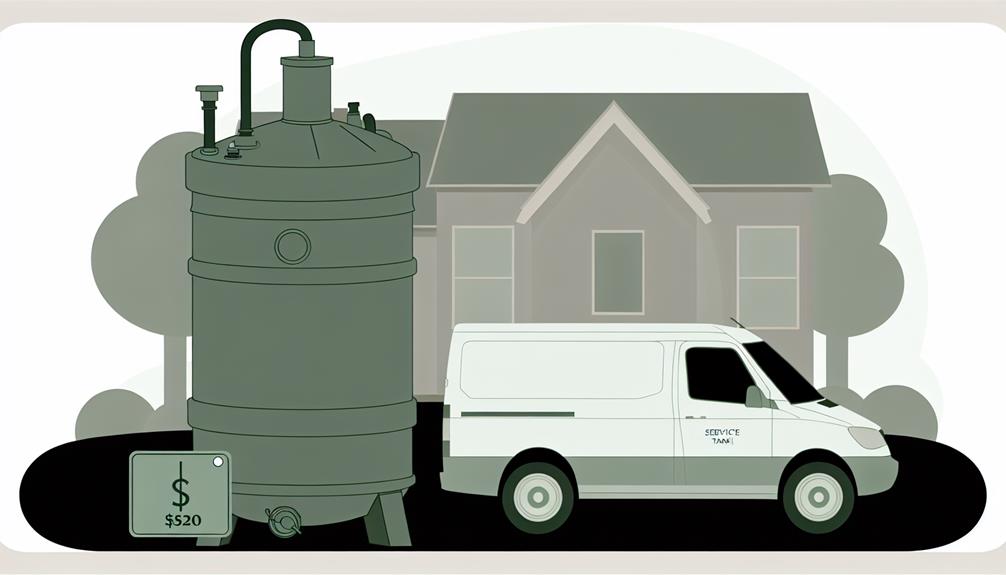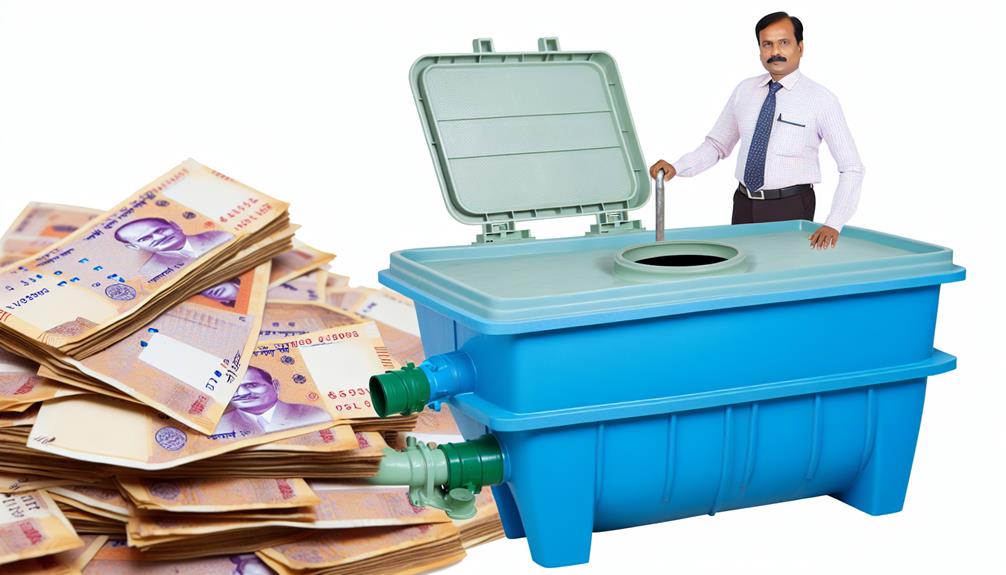Discover how to protect your septic system from breakdown with...
Read MoreYou & Your Septic Tank
What Does Professional Septic Tank Pumping Cost?
Our professional septic service team offers comprehensive septic tank pumping services to keep your system running smoothly. Get a FREE Quote Today.

What Does Professional Septic Tank Pumping Cost?
Have you ever found yourself wondering about the cost of professional septic tank pumping? It’s a topic you might not think about often, yet it’s essential for maintaining a healthy and functional home environment.
Various factors influence the cost, such as the size of your tank, the location of your home, and the level of cleaning required.
While it’s not the most glamorous aspect of homeownership, understanding the cost of septic tank pumping could save you a lot of hassle and unexpected expenses down the line.
Stick around, and you’ll find out how much you can expect to pay and how to potentially reduce those costs.
Key Takeaways
- Regular septic tank pumping is crucial for maintaining a healthy and functional home environment.
- The cost of septic tank pumping can vary depending on factors such as tank size, amount of waste, pump efficiency, geographic location, and accessibility.
- The average cost of septic pumping ranges from $200 to $500, with standard pumping costing around $200 to $300 and large tank pumping costing approximately $400 to $500.
- Additional services, emergency services, and factors like accessibility, location, and time of call can contribute to pricing variations.
Understanding Septic Tank Pumping

To fully understand septic tank pumping, you need to grasp the mechanics of a septic system and how regular maintenance can prevent costly repairs. It’s not just about emptying waste; it’s a comprehensive process that ensures your system’s longevity and efficiency.
The pumping frequency depends largely on your system’s septic capacity and the number of users. For instance, a family of four with a 1000-gallon tank should consider pumping every 3-5 years. Yet, if you’re a couple with the same tank size, you’d only need to pump every 5-8 years.
Remember, these are general guidelines. Other factors like the amount of wastewater generated, the volume of solids in wastewater, and your system’s health also influence the frequency.
Routine pumping helps to remove the sludge and scum, preventing them from clogging or damaging the drain field. It also allows for an inspection of the tank’s condition, identifying any potential issues early on.
Hence, delaying or ignoring this crucial task can lead to severe problems, such as system failure, groundwater contamination, and expensive repair or replacement costs.
Factors Influencing Pumping Costs
Several factors can influence the cost of septic tank pumping, including the size of your septic tank, the amount of waste that needs pumping, and the complexity of the job. Let’s look at these in more detail.
Firstly, the size of your septic tank matters. Larger tanks take more time and effort to pump, driving up costs.
Secondly, the amount of waste in your tank also impacts the price. The more waste there’s to remove, the longer the job will take, and the more you’ll have to pay.
Pump efficiency is another crucial factor. Higher efficiency pumps can handle larger volumes of waste in less time, potentially reducing labor costs. However, these high-efficiency pumps are more expensive, and this cost may be passed on to you.
Your geographic location also plays a role. In areas where septic tank pumping services are in high demand, you might find higher prices due to increased competition.
Additionally, if your property is hard to reach or the tank is difficult to access, this can add to the complexity of the job and thus increase costs.
Average Cost of Septic Pumping

Having considered the various factors that can impact your septic tank pumping cost, let’s now examine what you might expect to pay on average for this necessary service. The average cost usually ranges from $200 to $500, but pricing variations can occur due to location, tank size, and accessibility.
Here’s a simplified breakdown:
| Service | Average Cost | Pricing Variations |
|---|---|---|
| Standard Pumping | $200 – $300 | Location, tank size |
| Large Tank Pumping | $400 – $500 | Location, tank size, accessibility |
| Emergency Services | $300 – $450 | Time of call, distance |
| Additional Services | $100 – $200 | Type of service, difficulty |
| Total | $1000 – $2000 | All factors considered |
Emergency services usually incur higher costs, often due to the immediate nature of the job and potential for after-hours work. Additional services, such as filter cleaning or baffle repair, can also add to the final bill.
Tips to Lower Pumping Expenses
Despite the seemingly fixed costs, you can employ certain strategies to keep your septic tank pumping expenses in check. Effective budgeting strategies and preventive measures are integral to managing these costs.
Firstly, regular inspections and maintenance can prevent costly repairs or replacements. Don’t wait until a problem arises; proactively addressing potential issues can save you money in the long run.
Consider these tips:
- Conserve water: Less water entering the septic system means less strain, reducing the frequency of pumping.
- Avoid flushing non-degradable items: These can cause blockages, leading to expensive repairs.
- Use bacteria additives: These naturally break down waste, potentially extending the time between pumpings.
- Schedule regular inspections: Detecting and addressing minor issues early can prevent major, costly problems later.
Importance of Regular Maintenance

Regular maintenance of your septic tank is critical to its longevity and efficiency, potentially saving you significant costs in unnecessary repairs or replacements. Maintenance benefits aren’t just about cost-saving, but also about ensuring the system operates optimally. By taking preventive measures, you’re not only extending the life of your tank but also protecting your property and the environment from potential damage.
Let’s break down the benefits and preventive measures in a more digestible format:
| Maintenance Benefits | Preventive Measures | Long-term Impact |
|---|---|---|
| Cost-saving | Regular pumping | Prolongs tank life |
| Optimal operation | Inspect for leaks | Prevents soil pollution |
| Environmental protection | Monitor for overflows | Avoids property damage |
With regular checks and pumping, you’re ensuring your tank doesn’t overflow or leak, which can lead to soil pollution and property damage. It’s crucial to understand that proactive maintenance isn’t an unnecessary expense but an investment in your property’s longevity and safety. Always engage a professional for these tasks, as they have the expertise to spot and fix any potential issues before they escalate, ensuring you reap all the benefits of regular septic tank maintenance.
Frequently Asked Questions
What Are the Environmental Impacts of Improper Septic Tank Maintenance?
When you neglect septic tank maintenance, it can result in soil contamination and groundwater pollution. Harmful pathogens and chemicals seep into the earth, risking public health and causing severe environmental damage. It’s crucial to avoid this.
Can a Homeowner Legally Pump Their Own Septic Tank?
Yes, you can pump your own septic tank. However, DIY limitations and permit requirements may apply. Always check local regulations before proceeding to avoid potential fines or damage to your septic system.
How Can One Identify a Reliable and Professional Septic Tank Pumping Service?
To identify a reliable septic tank pumping service, you’ll need to consider service selection criteria like customer reviews, certifications, and experience. Also, inquire about their cost estimation methods to avoid unexpected charges.
How Does the Septic Tank Pumping Process Work?
You’ll first need to determine the pumping frequency based on your tank’s size and usage. Then, a professional will pump out the waste and possibly add septic additives to support the system’s bacteria. It’s quite straightforward.
What Potential Health Risks Are Associated With a Poorly Maintained Septic Tank?
You’re at risk of disease transmission from bacteria and viruses if your septic tank isn’t maintained. It can also lead to property damage due to overflow or leaks. Regular pumping mitigates these risks effectively.
Conclusion
Just like the heart of your home, your septic tank requires regular pumping to keep it functioning optimally.
The cost, influenced by various factors, averages around $200-$300. However, with savvy strategies, you can reduce these expenses.
Remember, investing in this regular maintenance safeguards your home, keeping your septic system healthy and running smoothly.
So, embrace the pumping ritual – it’s the heartbeat of a happy home.
You may also like...
Why Are DIY Fixes Essential for Septic Tank Pumping?
Tap into the importance of DIY fixes for septic tank...
Read MoreUnveiling the Average Costs of Septic Tank Pumping
Master the mysteries of septic tank pumping costs and avoid...
Read More
The Best Septic Tank Pumping Services Near You

Answer Some Questions
Let us know about your needs so we can find you the right septic tank pros.

Get Quotes
We will put you in touch with the right septic tank pros for your job and location.

Hire Right
Compare quotes, message or call pros, and hire only when ready.



